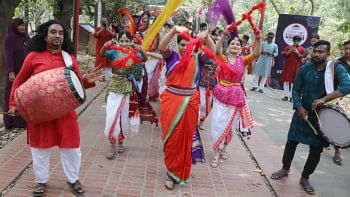Political will, not only roadmap

The usual flurry of activities of the political parties that precedes general elections is very evident, and so is the busyness of the election commission, who has devised a roadmap for the next general election as if it is their burden to work out a road map.
However, it is not only in Bangladesh that the election issue has generated a typical atmosphere of its own. Our friends abroad have also evinced keen interest in the forthcoming election, particularly in the state of democracy in Bangladesh. Noteworthy in this regard was an aborted "seminar" hosted by a Member of the British House of Lords, which among other things had "the worrying culture of impunity and democracy, rule of law" in its agenda. And it is the worrying culture of impunity, state of democracy, and rule of law are issues that we cannot disregard.
The ruling party has already started seeking vote, flaunting its indispensability for the continuity of the country's development. And the opposition is busy putting out the usual pre-condition, which is being summarily dismissed by the ruling party, both predictably so. The AL wants to be at the helm of the country's affairs when Bangladesh celebrates its 50th Anniversary in 2021; a wish it has made no secret of. For BNP ten years is too long to be out of power.
But first we must decide whether we want to have a ritual of an election, like for the 10th Parliament or one that would not be the cause of discomfort for the ruling party, like the 2014, and continues to be, an embarrassing subject, for both the major parties.
The ruling party would much rather not talk about it because of the way the election was conducted, and the arm twisting that the leader of the party, now donning the mantle of the so-called opposition in the current parliament, the Jatiyo Party, was subjected to, to make them participate in the election, and that included some "neighbourly" persuasion too.
And the BNP would like to forget it too; it is still suffering the consequence of, and ruing the miscalculation for, taking the most ill-advised steps—to boycott the election, and most appallingly, outsourcing violence to Jamaat. However, what is surprising is that not much is talked about the disposal of the cases related to the violence.
Unfortunately, both parties have made a virtue of violent agitation. BNP replicated the old tactics in 2014 but with more ferocity. One wonders what has happened to the hundreds of cases and thousands of people arrested in this connection. It so happens that among those arrested for creating anarchy and causing damage to private and public property in 2014 do not belong to only the BNP-JI cadres.
And the EC for its part has announced a "Road Map". One wonders what is meant by that particular phrase. One is not sure what is unique in the recently announced roadmap either. In fact, going through the seven or eight points narrated therein, it is a restatement of the EC's charter of duties like updating the voters' list or delimiting the constituencies. And one is always fearful about new "roadmaps". That suggests we are traversing a path we haven't been before. Is that so?
Having a parliament is no indicator of a thriving democracy and much has been written about it. And democracy means much more than quinquennial elections to the parliament. For a country whose raison d'être has been democracy, the decay of democratic culture is alarming. The ruling party's allergy to anything political or having the potential to threaten its return to power in 2019 is not being tolerated. That police would spoil a tea party in a politician's house to talk politics is unthinkable. The litigations against most of the BNP-supported city mayors are also an indication of democratic deficit. Need anything more be said to describe the current state of democracy in this country?
The roadmap is already there—the contending points had been addressed once and for all, one had hoped, in 1995, but regrettably revived after the 15th Amendment. The conduct of elections, a matter that regains salience every few years, particularly before elections, was a resolved matter. The 13th Amendment in 1996 was the outcome, albeit coerced from the BNP through the agitation of the AL. The CTG (caretaker government) was conveniently done away with by the AL by amending the Constitution in 2011, very hastily one might add, even before the full verdict of the Honourable Supreme Court was made available. The BNP tried the same mode of coercion, this time it had gone too far by targeting the people.
Both parties during their respective regimes, had tried to tinker with the CTG, BNP more blatantly perhaps, and AL more subtly have done away with the system. But while AL is cocksure that the BNP will have to come to the election it is equally aware that their moral grounds after the 2014 elections have become wobbly. That prick of conscience, one hopes, would move the AL enough to go beyond their much-stated position of "Nothing beyond the Constitution." After all a constitution is not a scripture that precludes going beyond it.
Whatever "roadmap" is devised, its success depends entirely on the political will to see it through. As for the EC it needs to apply the rules, regulation and provisions and not be seen as a handmaiden of the ruling party.
Brig Gen Shahedul Anam Khan, ndc, psc (Retd) is Associate Editor, The Daily Star.





Comments